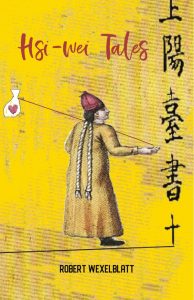Book Review
There is an admirable, lyrical splendor to Robert Wexelblatt’s heartwarming tales centered on the fictional Chen Hsi-wei, an itinerant Chinese shoemaker and celebrated peasant-poet of the Sui period. Previously, Wexelblatt, a professor of humanities at Boston University, merged creative writing and musical composition to great effect in his rather tuneful story collection, Petites Suites. His latest Hsi-wei Tales chart the adventures of a shy, benign, vagabond poet who once served as a war messenger to the future Emperor and chose to receive an education as a reward over gold, land, and concubines. His poetry earns him fame, public affection, and influence, and his nomadic lifestyle brings him in contact with people of all classes, educating him about political dilemmas, corruption, and community hardships. Through audiences with senior officials and the ruling classes, he is able to try to correct countless imbalances.
Nearly all of these twenty-eight stories are fashioned around one of Hsi-wei’s somewhat imposing—occasionally righteous—poems, with sensitive, understated verses that are enriched by their imagery. Sometimes given as a gift to show his appreciation (along with a pair of his well-made straw sandals) or sent to dignitaries, imparting subtle messages of admonishment, Hsi-wei’s poetry, supposedly a staple of the era, is an integral part of this collection. Pieces such as “Yellow Moon at Lake Weishan,” about a conversation between two poets, offer reflections not merely on nature but also on war and destruction, timelessness and loss. Hsi-wei’s purported “once famous” titular poem, discussing the tranquil lake that “lies cool and still as a forgotten bowl of tea” concludes:
The moon on the water looks so precious and enchanting,
I reach out to touch it and so, with my foolish hand,
spoil eternal peace.
Alas! If only I had refrained.
In the age of perpetual war, when nothing is safe or certain, serenity is ruined by one’s inability to refrain from action and fully embrace peace. Indeed, Hsi-wei’s guiding principles—appreciating the beauty of nature and encouraging compassion and harmony, as well as righting injustice and establishing social equality—form the foundation of this cycle of stories.
Although sharp and expressive, the poetry can, at times, seem spare and overly subtle. Arguably, the most affecting verses are those from “Letter to Yang Jian” in the story “Hsi-wei’s Famous Letter.” As a rule, Hsi-wei’s poems are open to interpretation, the deeper meanings are “like shadows cast by mountains,” and so the fierce candor of his words to the future Emperor Wen marks a welcome change in style. Amid implicit scenes of rape, arson, and murder, his poem, written at the request of a survivor of a brutal attack on her village by the General Yuchi Jiong, finishes with a bloodied widow pleading for the village girls to be spared. “Surely it’s enough to have made us destitute orphans and widows,” she beseeches, to which the general growls with contempt, “What presumption!”
For the most part, the narratives entail the empathetic Hsi-wei, a judicious impartial observer, wandering from village to village and, while earning his trade as a shoemaker, learning of disturbing abuses of power, land and property disputes, uprisings over harsh taxation systems, and various community feuds, protests, and tragedies. Surprisingly, Wexelblatt manages to avoid repetition and makes each story distinct, continually disclosing something new about the central character. Noteworthy morality tales include “Hsi-wei’s Justice,” whereby Hsi-wei impresses and charms the powerful Assessor Lai into rescinding an unmerited eviction notice, and “Hsi-wei’s Visit to Ko Qing-zhao,” in which he interferes with a court case in pursuit of justice while visiting his friend, an official in the magistrate’s office.
Invariably, Hsi-wei’s good judgment and gift for persuasive reasoning, combined with his kindliness and diplomacy, help find an amicable solution. Sometimes, it is his well-liked, influential poetry that rights a wrong, as is the case with “Hsi-wei and the Magistrate,” where his poem “Good to Protect the Good” seemingly removes a minister from power, exiles a corrupt landowner, and helps redistribute land to peasant farmers. On occasion, as with “Hsi-wei, the Monk, and the Landlord,” underhanded methods bring about a harmonious solution when an abbot dupes a landlord into reducing people’s rents, and it is a testament to the author’s powers of persuasion that he is able to convincingly advocate duplicity as a justifiable means. “What he practiced wasn’t deceit but pedagogy,” explains the abbot’s successor to the incredulous Hsi-wei. “And the proof is that, after halving the rents, he became a better man and therefore a wiser one.” Having been tricked into enlightenment, the landlord embarks on a more fulfilling and rewarding existence, to which Hsi-wei concedes:
To dupe the ignorant into looking
Is better than telling them what to see.
Wexelblatt’s Hsi-wei Tales is a wonderful fusion of poetry and prose that captivates and holds nuggets of wisdom far beyond the fortune cookie kind. The humble central character, nobly propagating amity and fairness, is a character of mythological proportions, yet one so affectionately etched into literature that one cannot help but admire the forethought that went into him. The delicate articulacy of his verse and the valiant way the author channels it throughout the collection to counter ill-doing, touches the hearts and minds of those Hsi-wei encounters. How he redresses the scales of justice is a testament to the power and timelessness of poetry. Like a pair of Hsi-wei’s durable sandals, this is a collection worthy of praise and preservation.
About the Reviewer
Nicholas Litchfield is the founding editor of the literary magazine Lowestoft Chronicle, author of the suspense novel Swampjack Virus, and editor of nine literary anthologies. His articles and stories appear in dozens of magazines and newspapers, and he has contributed introductions to numerous books, including Stark House Press reprints of long-forgotten noir and mystery novels of the 1950s and ’60s. Formerly a book reviewer for the Lancashire Evening Post and syndicated to twenty-five newspapers across the UK, he now writes for Publishers Weekly. Roam his website at www.nicholaslitchfield.com.
